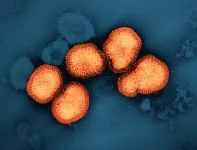(Press-News.org) Genetically speaking, we are individuals different from each other because of slight variations in our DNA sequences – so-called genetic variants – some of which have dramatic effects we can see and comprehend, from the color of our eyes to our risk for developing schizophrenia – a debilitating psychiatric condition affecting many millions worldwide. For several years, scientists have studied the entire genomes of thousands of people – called genome-wide association studies, or GWAS – to find approximately 5,000 genetic variants associated with schizophrenia.
Now, UNC School of Medicine scientists and colleagues are figuring out which of these variants have a causal effect in the development of the schizophrenia. They are finding that some of genetic variants regulate or alter the expression of genes involved in the condition.
Published in the journal Cell Genomics, this research marks a big step forward in our understanding of the genetic basis of schizophrenia.
“Our findings not only provide insights into the intricate regulatory landscape of genes, but also propose a groundbreaking approach to decoding the cumulative effect of genetic variants on gene regulation in individuals with schizophrenia,” said senior author Hyejung Won, Ph.D., associate professor of genetics at the UNC School of Medicine. “This comprehension could potentially pave a path for more precise interventions and therapies in the future. Right now, therapeutic options are limited, and some people do not respond to drugs available.”
For this study, Won and first authors Jessica McAfee and Sool Lee, both UNC-Chapel Hill graduate students, led a team of researchers from UCLA, Harvard, the University of Michigan, and Human Technopole in Italy to explore the genetic variants already linked to the risk of schizophrenia through GWAS research. Their goal was to figure out a way to tease apart meaningless variants from those with potential for biological activity important for developing schizophrenia. This isn’t easy for a few reasons, one of which is that genetic variants are often inherited together from parents. So, right next to each other could be two genetic variants associated with the condition – one might be important for gene expression that plays a major role in the condition, but the other variant might not have any role in the condition.
To tackle this problem, the researchers used a special technique called a massively parallel reporter assay (MPRA) – essentially a genetic sequencing technique that can parse which variants trigger gene expression and which ones don’t. To use this method, the researchers introduced the 5,000 variants into human brain cells in a dish, cells that are essential for early brain development. These variants may or may not cause the expression of their downstream gene and genetic barcode. The barcode, a 20bp DNA sequence, is unique to each variant. This is what the group uses to distinguish the variant sequences. The MPRA revealed 439 genetic variations with actual biological effects, meaning they can alter expression of gene.
“Traditionally, scientists have used other epigenetic data, such as transcription factor binding and biochemically defined enhancers, to identify variants with biological effects,” Won said.
“However, these conventional methods failed to predict a large portion of variants we identified to have biological effects. Our work points to a wealth of unexplored variants with biological effects.”
To understand how these variants work together to influence gene activity, Won and colleagues developed a new model that combines data from MPRA with chromatin architecture of brain cells – that is, the genetic information important for how brain cell DNA is organized. By doing this, the researchers could connect these 439 variants to how genes are turned on or off.
“Schizophrenia is a complex condition that is highly heritable,” Won said. “To find these 439 potentially causal variants is a big step, but we still have a lot of work ahead to figure out the complicated genetic architecture that leads an individual to develop this condition. With that information in hand, we could begin to understand the biological mechanism underlying this complex disorder, which may eventually lead to targeted therapies.”
END
Scientists take next big step in understanding genetics of schizophrenia
2023-09-15
ELSE PRESS RELEASES FROM THIS DATE:
RIT collaboration with global team confirms, disproves distant galaxies
2023-09-15
Rochester Institute of Technology scientists have once again used data from the James Webb Space Telescope (JWST) as part of the Cosmic Evolution Early Release Science (CEERS) Survey to change the way we think about the universe and its distant galaxies.
Jeyhan Kartaltepe, associate professor in the School of Physics and Astronomy, and Rebecca Larson, postdoctoral research associate, co-authored a paper, “Confirmation and refutation of very luminous galaxies in the early Universe,” published in Nature confirming ...
In major breakthrough, researchers close in on preeclampsia cure
2023-09-15
Researchers from Western and Brown University have made groundbreaking progress towards identifying the root cause and potential therapy for preeclampsia.
The pregnancy complication affects up to eight per cent of pregnancies globally and is the leading cause of maternal and fetal mortality due to premature delivery, complications with the placenta and lack of oxygen.
The research, led by Drs. Kun Ping Lu and Xiao Zhen Zhou at Western, and Drs. Surendra Sharma and Sukanta Jash at Brown, has identified ...
Facebook's design makes it unable to control misinformation
2023-09-15
WASHINGTON (September 15, 2023) – As misinformation flourished online during the Covid-19 pandemic, a number of platforms announced policies and practices aimed at combating the spread of misinformation. Did those efforts work?
New research published today in Science Advances suggests that the Covid-19 vaccine misinformation policies of Facebook, the world’s largest social media platform, were not effective in combating misinformation. The study, led by researchers at the George Washington University, found that Facebook’s efforts were undermined by the core design features ...
Study shows replanting logged forests with diverse mixtures of seedlings accelerates restoration
2023-09-15
Twenty-year experiment finds that active replanting beats natural recovery for restoring logged tropical forests.
The higher the diversity of replanted tree species, the more quickly canopy area and biomass recovered.
Results emphasize the importance of preserving biodiversity in pristine forests and restoring it in recovering logged forest.
Satellite observations of one of the world’s biggest ecological experiments on the island of Borneo have revealed that replanting logged forests with diverse mixtures of seedlings can significantly accelerate their recovery. The results have been published today in the journal Science Advances.
The ...
NIH clinical trial of universal flu vaccine candidate begins
2023-09-15
Enrollment in a Phase 1 trial of a new investigational universal influenza vaccine candidate has begun at the National Institutes of Health’s Clinical Center in Bethesda, Maryland. The trial is sponsored by the National Institute of Allergy and Infectious Diseases (NIAID), part of the NIH, and will evaluate the investigational vaccine for safety and its ability to elicit an immune response.
Currently available seasonal influenza (or “flu”) vaccines are effective at preventing specific strains of influenza. Each year, the vaccines are re-evaluated and changed to best match the strains of flu predicted to be the most dominant in the upcoming flu ...
UMass Amherst neuroscientist aims to advance knowledge of human brain development by mapping the sea slug brain
2023-09-15
A University of Massachusetts Amherst neuroscientist has been awarded a $3.1 million grant from the National Institute of Neurological Disease and Stroke to advance knowledge on human brain development by using an unusual subject: the brain of the sea slug.
This tiny invertebrate is an ideal candidate to study for brain development because it adds a countable number of neurons to its brain – the number increases more than 40-fold in less than eight weeks to a total of about 10,000 neurons – while the animal grows and performs behaviors, ...
No pollen, no seeds
2023-09-15
North Carolina State University researchers have successfully transferred an important gene from one compartment of a plant cell to another to produce tobacco plants that lack pollen and viable seeds, while otherwise growing normally. Their findings could lead to better ways of producing hybrid seeds to maximize crop productivity, or to introduce seedlessness in fruit species lacking the often-desired trait, such as raspberries, blackberries or muscadine grapes.
The researchers began the work in the energy-producing portion of a cell, the mitochondria. In plants, aberrations within the mitochondrial genome can be associated with ...
Hydroelectric power plants in Brazil threaten turtles that depend on rapids, study warns
2023-09-15
A research project supported by FAPESP shows that the construction of new hydroelectric power plants in Brazil’s South region could have an impact on more than 30% of the habitat of Phrynops williamsi, the Williams’ side-necked turtle. The species occurs only in areas of Atlantic Rainforest and Pampa (the grassland biome adjacent to Brazil’s border with Uruguay and Argentina), and is classed as “Vulnerable” (facing a high risk of extinction) by the International Union for Conservation of Nature (IUCN).
An article on the study is published in the Journal of Applied Ecology by ...
NIH awards $13.7 million grant to BU researchers investigating genetics of Alzheimer’s disease
2023-09-15
(BOSTON)—The National Institutes of Health/National Institute on Aging recently awarded a $13.7 million grant to a project led by Boston University Chobanian & Avedisian School of Medicine principal investigators Lindsay Farrer, PhD, chief of biomedical genetics and distinguished professor of genetics, and Richard Sherva, PhD, assistant professor of medicine in biomedical genetics, for research using whole genome sequencing and other approaches to identify genetic factors for Alzheimer disease (AD) in Jews currently living in ...
Purdue researcher awarded $1.3 million for malaria drug trials in Southeast Asia and Africa
2023-09-15
WEST LAFAYETTE, Ind. – A Purdue researcher is taking a giant leap forward in the fight against drug-resistant strains of malaria in developing countries.
Open Philanthropy has awarded $1.38 million to Philip Low to further validate a drug therapy that he and his colleagues have previously shown to successfully treat the disease. Low (rhymes with “now”) is Purdue University’s Presidential Scholar for Drug Discovery and the Ralph C. Corley Distinguished Professor of Chemistry in the College of Science.
For years, experts ...




